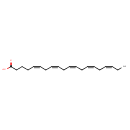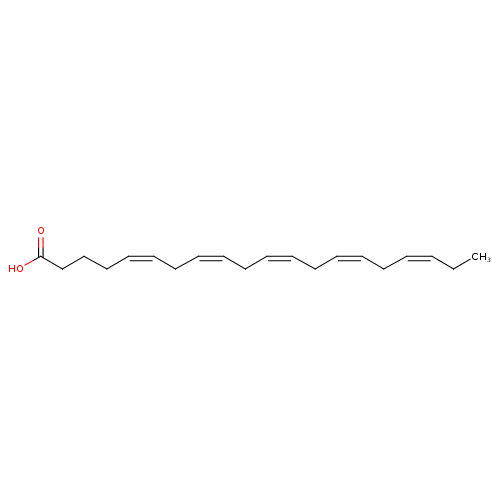|
Record Information |
|---|
| Version |
1.0 |
|---|
| Update Date |
1/22/2018 11:54:54 AM |
|---|
|
Metabolite ID | PAMDB120150 |
|---|
|
Identification |
|---|
| Name: |
eicosapentaenoate |
|---|
| Description: | An icosapentaenoate that is the conjugate base of all-cis-5,8,11,14,17-icosapentaenoic acid, arising from deprotonation of the carboxylic acid group. |
|---|
|
Structure |
|
|---|
| Synonyms: | - (5Z,8Z,11Z,14Z,17Z)-eicosapentaenoate
- (EPA; 20:5n3)
- all-cis-5,8,11,14,17-eicosapentaenoate
- all-cis-5,8,11,14,17-icosapentaenoate
- cis-Δ5,8,11,14,17-eicosapentaenoate
- eicosapentaenoate
- icosapentaenoate
|
|---|
|
Chemical Formula: |
C20H29O2 |
|---|
| Average Molecular Weight: |
301.448 |
|---|
| Monoisotopic Molecular
Weight: |
302.22458 |
|---|
| InChI Key: |
JAZBEHYOTPTENJ-RCHUDCCISA-M |
|---|
| InChI: | InChI=1S/C20H30O2/c1-2-3-4-5-6-7-8-9-10-11-12-13-14-15-16-17-18-19-20(21)22/h3-4,6-7,9-10,12-13,15-16H,2,5,8,11,14,17-19H2,1H3,(H,21,22)/p-1/b4-3+,7-6+,10-9+,13-12+,16-15+ |
|---|
| CAS
number: |
10417-94-4 |
|---|
| IUPAC Name: | (5Z,8Z,11Z,14Z,17Z)-icosa-5,8,11,14,17-pentaenoate |
|---|
|
Traditional IUPAC Name: |
eicosapentaenoic acid |
|---|
| SMILES: | CCC=CCC=CCC=CCC=CCC=CCCCC(=O)[O-] |
|---|
|
Chemical Taxonomy |
|---|
|
Taxonomy Description | This compound belongs to the class of organic compounds known as long-chain fatty acids. These are fatty acids with an aliphatic tail that contains between 13 and 21 carbon atoms. |
|---|
|
Kingdom |
Organic compounds |
|---|
| Super Class | Lipids and lipid-like molecules |
|---|
|
Class |
Fatty Acyls |
|---|
| Sub Class | Fatty acids and conjugates |
|---|
|
Direct Parent |
Long-chain fatty acids |
|---|
| Alternative Parents |
|
|---|
| Substituents |
- Long-chain fatty acid
- Unsaturated fatty acid
- Straight chain fatty acid
- Monocarboxylic acid or derivatives
- Carboxylic acid
- Carboxylic acid derivative
- Organic oxygen compound
- Organic oxide
- Hydrocarbon derivative
- Organooxygen compound
- Carbonyl group
- Aliphatic acyclic compound
|
|---|
| Molecular Framework |
Aliphatic acyclic compounds |
|---|
| External Descriptors |
|
|---|
|
Physical Properties |
|---|
| State: |
Solid |
|---|
| Charge: | -1 |
|---|
|
Melting point: |
Not Available |
|---|
| Experimental Properties: |
| Property | Value | Reference |
|---|
| Melting Point | Not Available | Not Available | | Boiling Point | Not Available | Not Available | | Water Solubility | Not Available | Not Available | | LogP | Not Available | Not Available |
|
|---|
| Predicted Properties |
|
|---|
|
Biological Properties |
|---|
| Cellular Locations: |
Not Available |
|---|
| Reactions: | |
|---|
|
Pathways: |
- Alpha Linolenic Acid and Linoleic Acid Metabolism pae00592
|
|---|
|
Spectra |
|---|
| Spectra: |
|
|---|
|
References |
|---|
| References: |
- Hino K, Murakami Y, Nagai A, Kitase A, Hara Y, Furutani T, Ren F, Yamaguchi Y, Yutoku K, Yamashita S, Okuda M, Okita M, Okita K: Alpha-tocopherol [corrected] and ascorbic acid attenuates the ribavirin [corrected] induced decrease of eicosapentaenoic acid in erythrocyte membrane in chronic hepatitis C patients. J Gastroenterol Hepatol. 2006 Aug;21(8):1269-75. [16872308 ]
- Francois CA, Connor SL, Bolewicz LC, Connor WE: Supplementing lactating women with flaxseed oil does not increase docosahexaenoic acid in their milk. Am J Clin Nutr. 2003 Jan;77(1):226-33. [12499346 ]
- Hafstrom I, Ringertz B, Gyllenhammar H, Palmblad J, Harms-Ringdahl M: Effects of fasting on disease activity, neutrophil function, fatty acid composition, and leukotriene biosynthesis in patients with rheumatoid arthritis. Arthritis Rheum. 1988 May;31(5):585-92. [2837251 ]
- Woodman RJ, Mori TA, Burke V, Puddey IB, Barden A, Watts GF, Beilin LJ: Effects of purified eicosapentaenoic acid and docosahexaenoic acid on platelet, fibrinolytic and vascular function in hypertensive type 2 diabetic patients. Atherosclerosis. 2003 Jan;166(1):85-93. [12482554 ]
- Sipka S, Dey I, Buda C, Csongor J, Szegedi G, Farkas T: The mechanism of inhibitory effect of eicosapentaenoic acid on phagocytic activity and chemotaxis of human neutrophil granulocytes. Clin Immunol Immunopathol. 1996 Jun;79(3):224-8. [8635279 ]
- Miwa H, Yamamoto M, Futata T, Kan K, Asano T: Thin-layer chromatography and high-performance liquid chromatography for the assay of fatty acid compositions of individual phospholipids in platelets from non-insulin-dependent diabetes mellitus patients: effect of eicosapentaenoic acid ethyl ester administration. J Chromatogr B Biomed Appl. 1996 Mar 3;677(2):217-23. [8704924 ]
- Kim HH, Shin CM, Park CH, Kim KH, Cho KH, Eun HC, Chung JH: Eicosapentaenoic acid inhibits UV-induced MMP-1 expression in human dermal fibroblasts. J Lipid Res. 2005 Aug;46(8):1712-20. Epub 2005 Jun 1. [15930517 ]
- Gillis RC, Daley BJ, Enderson BL, Karlstad MD: Eicosapentaenoic acid and gamma-linolenic acid induce apoptosis in HL-60 cells. J Surg Res. 2002 Sep;107(1):145-53. [12384078 ]
- Takenaga M, Hirai A, Terano T, Tamura Y, Kitagawa H, Yoshida S: Comparison of the in vitro effect of eicosapentaenoic acid (EPA)-derived lipoxygenase metabolites on human platelet function with those of arachidonic acid. Thromb Res. 1986 Feb 1;41(3):373-84. [3010490 ]
- Hereliuk VI: [The role of arachidonic and eicosapentaenoic acid lipoxygenase products in the pathogenesis of generalized parodontosis] Fiziol Zh. 2000;46(6):112-5. [11424554 ]
- Aas V, Rokling-Andersen MH, Kase ET, Thoresen GH, Rustan AC: Eicosapentaenoic acid (20:5 n-3) increases fatty acid and glucose uptake in cultured human skeletal muscle cells. J Lipid Res. 2006 Feb;47(2):366-74. Epub 2005 Nov 21. [16301737 ]
- Kim HH, Cho S, Lee S, Kim KH, Cho KH, Eun HC, Chung JH: Photoprotective and anti-skin-aging effects of eicosapentaenoic acid in human skin in vivo. J Lipid Res. 2006 May;47(5):921-30. Epub 2006 Feb 7. [16467281 ]
- Herrmann W, Beitz J: [Decreasing atherogenic risks by an eicosapentaenoic acid-rich diet] Z Gesamte Inn Med. 1987 Mar 1;42(5):117-22. [3035811 ]
- Ide T, Okamura T, Kumashiro R, Koga Y, Hino T, Hisamochi A, Ogata K, Tanaka K, Kuwahara R, Seki R, Sata M: A pilot study of eicosapentaenoic acid therapy for ribavirin-related anemia in patients with chronic hepatitis C. Int J Mol Med. 2003 Jun;11(6):729-32. [12736713 ]
- Dunstan JA, Roper J, Mitoulas L, Hartmann PE, Simmer K, Prescott SL: The effect of supplementation with fish oil during pregnancy on breast milk immunoglobulin A, soluble CD14, cytokine levels and fatty acid composition. Clin Exp Allergy. 2004 Aug;34(8):1237-42. [15298564 ]
- Luostarinen R, Saldeen T: Dietary fish oil decreases superoxide generation by human neutrophils: relation to cyclooxygenase pathway and lysosomal enzyme release. Prostaglandins Leukot Essent Fatty Acids. 1996 Sep;55(3):167-72. [8931114 ]
- Calzada C, Vericel E, Lagarde M: Lower levels of lipid peroxidation in human platelets incubated with eicosapentaenoic acid. Biochim Biophys Acta. 1992 Jul 29;1127(2):147-52. [1643099 ]
- Lagarde M, Croset M, Vericel E, Calzada C: Effects of small concentrations of eicosapentaenoic acid on platelets. J Intern Med Suppl. 1989;731:177-9. [2539831 ]
- Bays HE, Ballantyne CM, Kastelein JJ, Isaacsohn JL, Braeckman RA, Soni PN: Eicosapentaenoic acid ethyl ester (AMR101) therapy in patients with very high triglyceride levels (from the Multi-center, plAcebo-controlled, Randomized, double-blINd, 12-week study with an open-label Extension [MARINE] trial). Am J Cardiol. 2011 Sep 1;108(5):682-90. doi: 10.1016/j.amjcard.2011.04.015. Epub 2011 Jun 16. [21683321 ]
|
|---|
| Synthesis Reference: |
Sandri, Jacqueline; Viala, Jacques. Syntheses of all-(Z)-5,8,11,14,17-Eicosapentaenoic Acid and all-(Z)-4,7,10,13,16,19-Docosahexaenoic Acid from (Z)-1,1,6,6-tetraisopropoxy-3-hexene. Journal of Organic Chemistry (1995), 60(20), 6627-30. |
|---|
| Material Safety Data Sheet (MSDS) |
Not Available |
|---|
|
Links |
|---|
| External Links: |
|
|---|


